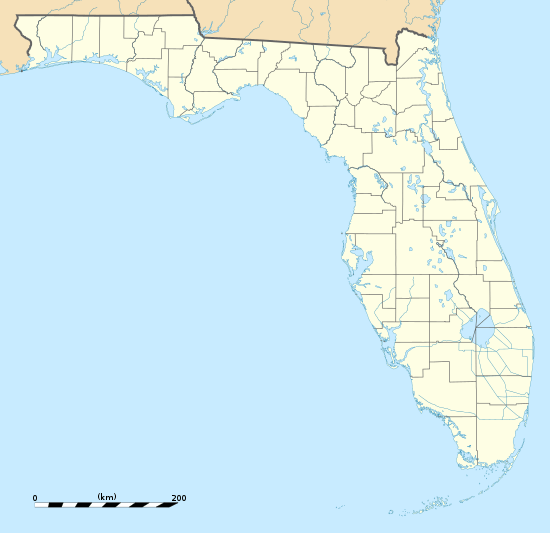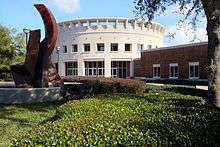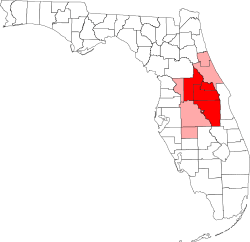Orlando Museum of Art
The Orlando Museum of Art (OMA) is a 501 (c) 3 not-for-profit organization directly serving greater Orlando, Orange County and Central Florida. The museum was founded in 1924 by a group of art enthusiasts. The museum's mission is to inspire creativity, passion and intellectual curiosity by connecting people with art and new ideas. Dr. Luder Whitlock is the museum's interim director.
 | |
 Location within Florida | |
| Established | 1924[1] |
|---|---|
| Location | 2416 North Mills Avenue Orlando, Florida |
| Coordinates | 28.57271°N 81.36444°W |
| Type | Art[2] |
| Director | Dr. Luder Whitlock [2] |
| Curator | Hansen Mulford[2] |
| Public transit access | |
| Website | www |

General
OMA presents a rotating series of temporary exhibitions originated by the museum matched by travelling shows that are complemented by permanent collection exhibitions and continuous education programs for people of all ages. OMA hosts year-round workshops, art appreciation classes, lectures, seminars, films and guided tours for children and adults.
In 2014, the museum launched the exhibition initiative titled The Florida Prize in Contemporary Art which features work produced by the most progressive and thought-provoking emerging and mid-career artists living and working in the State of Florida today.
In 2020, Dr. Luder Whitlock was named the Interim Executive Director with the removal of Glen Gentele.
OMA is accredited by the American Alliance of Museums (AAM) and is a member of the North American Reciprocal Museums program.[3]
History
The history of the Orlando Museum of Art (OMA) is one of growth guided by community leadership. OMA was founded in 1924 as Orlando Art Association. Its name was changed to the Loch Haven Art Center in 1960, and again to the Orlando Museum of Art in 1986.
The organization began as a small art center with a group of artists who met informally in the early 1920s, displaying and critiquing their work. In the late 1950s, the community raised funds to build a new facility designed by James Gamble Rogers III, which was completed in 1960.
OMA began to collect art in 1960 when it accepted the donations of important American paintings by Georgia O'Keeffe and Charles Sheeler. OMA continued its expansion, working with architects Nils Schweizer and Duane Stark, both students of Frank Lloyd Wright. By 1969 OMA had added new galleries, a 250-seat auditorium, three studio classrooms, a library, vault and offices.
During the 1970s, OMA was given a major collection of Art of the Ancient Americas, and additional works of African Art, and also formed the nucleus of its acclaimed Contemporary American Graphics Collection.
In 1985, OMA was designated a "major cultural institution" by the State of Florida.
In the 1997, OMA completed a $13.5 million facility renovation and building project which expanded the facility to its current size of 80,000 square feet.[4]
Collections
OMA's collection boasts more than 2,400 objects including Contemporary Art, American Art from the 18th century to 1945, Art of the Ancient Americas and African Art. The Art of the Ancient Americas collection is among the finest of its kind in the Southeastern United States.[3]
On May 1, 2018, OMA announced that it may become the permanent home of an extensive collection of the paintings of Belgian Post-Impressionist painter, Louis Dewis. OMA presented a small exhibition of seven Dewis paintings from May 18 through September 9, 2018, as a preview of a major Dewis exhibition presented January 25 through May 5, 2019.[5]
Notes
- Orlando Museum of Art. "about the museum", Orlando Museum of Art website. Retrieved on November 05, 2007.
- MuseumsUSA. "Orlando Museum of Art Orlando, Florida", MuseumsUSA website, 2007. Retrieved on November 05, 2007.
- Art, Orlando Museum of. "Orlando Museum of Art". omart.org. Retrieved 2016-03-29.
- Orlando Museum of Art - Forward to 100 Vision Plan. Orlando, Florida, United States. 2015.
- "LOUIS DEWIS: A BELGIAN POST-IMPRESSIONIST". Orlando Museum of Art.
External links
| Wikimedia Commons has media related to Orlando Museum of Art. |
- Orlando Museum of Art (official website)
- Orlando Museum of Art. Museum information from Traditional Fines Arts Organization including descriptions of exhibitions
- Orlando Museum of Art Orlando, Florida. Museum Info webpage from MuseumUSA.org.
